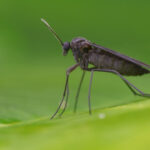Fruit flies, those tiny, persistent pests buzzing around your fruit bowl, are a common household nuisance. Scientifically known as Drosophila melanogaster, these “dew-loving” insects are drawn to ripeness and decay. You’ve likely swatted them away countless times, but have you ever stopped to wonder: Will Fruit Flies Make You Sick? This question is more relevant than you might think, especially if you’re finding them a constant presence in your kitchen. Let’s delve into the world of fruit flies to understand the potential health implications and how to keep your home fruit fly-free.
What Exactly Are Fruit Flies?
Fruit flies are small, but noticeable. Adult fruit flies typically measure about 0.12 inches in length and 0.08 inches in width, sporting a classic fly shape in miniature. Their bodies are usually tan or brownish-black, topped with a rounded head featuring small antennae. Look closely, and you’ll see three simple eyes alongside their prominent, red compound eyes. Like other flies, they possess a single pair of wings originating from their mid-section.
It’s easy to confuse fruit flies with gnats, another tiny flying insect. However, gnats are generally darker, often entirely black, and have a slimmer body compared to the fruit fly’s more rounded form.
Fruit flies are primarily fruit eaters throughout their entire life cycle. Adults expand their palate to include rotting plants, while freshly hatched larvae depend entirely on the food source where they were laid. This dietary preference is a key reason why they become household pests, especially in kitchens.
Where Do Fruit Flies Come From in Your Home?
Originating from tropical regions, fruit flies have spread globally, excluding Antarctica, thanks to human travel and trade. They thrive in temperate climates with readily available water sources. As temperatures drop, fruit flies seek refuge indoors, particularly gravitating towards areas where food is stored.
The appearance of fruit flies in your home usually signals the presence of readily available food sources. Openly displayed fruits are a major attractant, especially if they are becoming overripe. Fruit flies are irresistibly drawn to fermenting and decaying fruits and vegetables, as well as other tempting items like:
- Wine
- Beer
- Vinegar
- Fruit juice
Interestingly, even unripe fruit isn’t safe from their attention. Fruit flies often prefer laying eggs on unripe fruit, ensuring a food source is available when the larvae hatch.
Can Fruit Flies Pose a Health Risk?
While fruit flies are undeniably annoying, the crucial question remains: can fruit flies make you sick? The good news is that fruit flies are not known to transmit diseases to humans in the same way as house flies or mosquitoes. They are not vectors for serious illnesses. However, this doesn’t mean they are entirely harmless from a health perspective.
Fruit flies breed and feed in less-than-sanitary environments, including rotting fruit, garbage disposals, and drains. This means they can pick up bacteria and other microorganisms on their bodies and legs. When they land on your food, they can transfer these contaminants.
While the risk of contracting a serious illness from fruit flies is low, they can potentially spread bacteria like E. coli and Salmonella. These bacteria can cause gastrointestinal issues, leading to symptoms like diarrhea, vomiting, and stomach cramps. For individuals with weakened immune systems, young children, and the elderly, the risk of infection might be slightly higher.
Furthermore, fruit flies can be an indicator of unsanitary conditions in your home. Their presence suggests that there are decaying organic materials that could also attract other, more harmful pests.
Minimizing Fruit Fly Risks and Infestations
While fruit flies are unlikely to cause serious illness, it’s still best to minimize their presence in your home to maintain hygiene and prevent potential bacterial contamination. Here are effective strategies:
- Eliminate Food Sources: The most crucial step is to remove what attracts them.
- Store fruits and vegetables in the refrigerator or sealed containers.
- Promptly dispose of overripe or rotting produce.
- Clean up spills of juice, wine, or other sugary liquids immediately.
- Regularly empty and clean garbage cans, especially kitchen bins.
- Clean Potential Breeding Grounds: Fruit flies can breed in unexpected places.
- Clean drains and garbage disposals regularly, as decaying organic matter can accumulate there.
- Wipe down countertops and surfaces to remove any food residue.
- Rinse out empty bottles and cans before recycling or discarding them.
- Use Fruit Fly Traps: If you have an ongoing infestation, traps can help reduce the population. Simple DIY traps using apple cider vinegar and dish soap can be very effective.
Conclusion: Fruit Flies and Your Health
So, will fruit flies make you sick? Directly, probably not in a serious way. They are not major disease carriers. However, fruit flies can harbor and transmit bacteria due to their feeding and breeding habits in unsanitary environments. While the risk of serious illness is low, particularly for healthy adults, it’s wise to minimize contact with them and prevent infestations to maintain a hygienic kitchen and reduce potential exposure to harmful bacteria. By focusing on good sanitation and eliminating food sources, you can effectively manage fruit flies and keep your home a healthier, less buzzy place.

